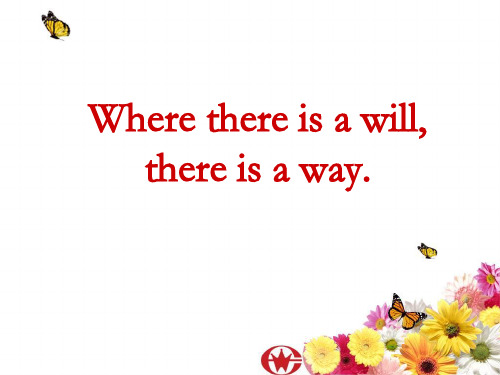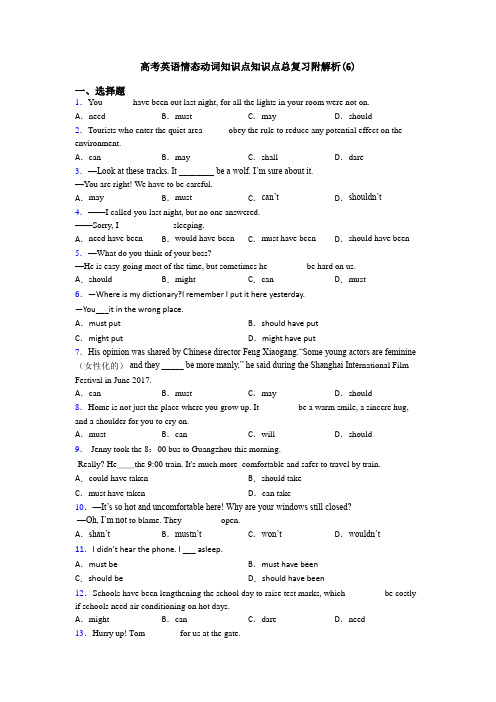2014高考英语 语法专项复习 第6讲 情态动词素材
- 格式:doc
- 大小:220.00 KB
- 文档页数:7




高考英语情态动词知识点知识点总复习附解析(6)一、选择题1.You ______ have been out last night, for all the lights in your room were not on.A.need B.must C.may D.should 2.Tourists who enter the quiet area _____ obey the rule to reduce any potential effect on the environment.A.can B.may C.shall D.dare3.—Look at these tracks. It ________ be a wolf. I’m sure about it.—You are right! We have to be careful.A.may B.must C.can’t D.shouldn’t 4.——I called you last night, but no one answered.——Sorry, I____________ sleeping.A.need have been B.would have been C.must have been D.should have been 5.—What do you think of your boss?—He is easy-going most of the time, but sometimes he ________ be hard on us.A.should B.might C.can D.must 6.—Where is my dictionary?I remember I put it here yesterday.—You___it in the wrong place.A.must put B.should have putC.might put D.might have put7.His opinion was shared by Chinese director Feng Xiaogang.“Some young actors are feminine (女性化的)and they _____ be more manly,” he said during the Shanghai Inte rnational Film Festival in June 2017.A.can B.must C.may D.should8.Home is not just the place where you grow up. It ________ be a warm smile, a sincere hug, and a shoulder for you to cry on.A.must B.can C.will D.should9.-Jenny took the 8:00 bus to Guangzhou this morning.-Really? He__the 9:00 train. It's much more comfortable and safer to travel by train. A.could have taken B.should takeC.must have taken D.can take10.—It’s so hot and uncomfortable here! Why are your windows still closed?—Oh, I’m not to blame. They ________ open.A.shan’t B.mustn’t C.won’t D.wouldn’t11.I didn’t hear the phone. I ___ asleep.A.must be B.must have beenC.should be D.should have been12.Schools have been lengthening the school day to raise test marks, which ________ be costly if schools need air conditioning on hot days.A.might B.can C.dare D.need13.Hurry up! Tom _______ for us at the gate.A.must wait B.must be waitingC.can be waiting D.must have waited14.It was so noisy that we hear ourselves speak.A.couldn’t B.shouldn’tC.mustn’t D.needn’t15.I still remember my happy childhood when my mother ___________ take me to Disneyland at weekends.A.might B.mustC.would D.should16.Louis Cha (金庸) passed away. As for his achievement, there is such a comment, “He ______ the Nobel Prize for Literature with his written works translated into English.”A.could have been rewarded B.must have been rewardedC.should be rewarded D.need have been rewarded 17.(2018·北京) In today’s information age, the loss of data _________ cause s erious problems for a company.A.need B.shouldC.can D.must18.Helen________ go on the trip with us, but she isn’t quite sure yet.A.shall B.may C.must D.can19.------ Tom is never late for work. Why is he absent today?------ Something _________ to him.A.must happen B.should have happenedC.could have happened D.must have happened20.The girl _________ out alone at night.A.dare not go B.dare not to go C.dares not go D.not dare go 21.Although passing the driving test ________ be difficult now, it’s worth the efforts. A.need B.shallC.can D.should22.There’s no light on --- they _______ be at home.A.can’t B.mustn’t C.needn’t D.wouldn’t23.I____________ go to a summer camp during the summer vacation, but I am not sure. A.might B.can C.must D.need24.—Do you know where Tony is?—He _________ in the living room. I saw him there just now.A.shall be B.should have been C.might have been D.must be 25.—Isn’t that Ann’s husband over there?— No, it ________ be him —I’m sure he doesn’t wear glasses.A.must not B.c an’t C.won’t D.may not【参考答案】***试卷处理标记,请不要删除一、选择题1.B解析:B【解析】【详解】考查情态动词的用法。

高考英语情态动词语法知识点与用法高考英语情态动词语法知识点情态动词一、can和could1、can的用法(1)表示体力和脑力方面的能力。
(2)表示对现在的动作或状态进行主观的猜测,主要用在否定句和疑问句中。
(3)表示可能性,理论上的可能性,意为“有时候可能会”,可用于肯定句。
(4)表示允许,意思与may接近。
(5)表示说话人的推测、怀疑、惊异、猜测或不肯定等,主要用于否定句、疑问句或感叹句中。
(6)can的特殊句型cannot…too / enough表示“无论怎么。
也不过分”。
“越。
越好”。
cannot but+ do sth.表示“不得不,只好”。
2、could的用法(1)表示能力,指的是过去时间。
(2)表示允许,指的是过去时间。
(3)表示可能,可以指过去时间,也可以指现在时间,表示语气缓和。
(4)委婉客气地提出问题或陈述看法,指的是现在时间。
主要用于疑问句,回答时用can。
3、can与could的区别can表推测时只用于否定句和疑问句(could无此限制)。
couldn’t的可能性比can’t小。
4、can与be able to的区别(1)现在时:无区别,但后者不常用。
(2)完成时;can没有完成时,此时要用have(has,had)been able to。
(3)将来时:can没有将来时,要用will be able to。
(4)过去时:could表示一般能力,was/were able to 表示在具体场合通过努力成功做成某事的能力。
二、may 和might1、may的用法(1)表示询问或说明一件事可不可以做。
(2)表示一件事或许会发生或某种情况可能会存在,通常用在肯定句和否定句中。
注意:表示可能性时,can’t语气强,表示“不可能”,may not语气弱,表示“可能不”。
2、might的用法(1)表示询问或允许,指的是过去时间。
(2)表示可能发生的事,可以指过去时间,也可以指现在时间,语气更加不肯定,可能性比may小一些。

第六讲时态和语态典型例题1.高考考查的八种动词时态是:一般现在时,一般过去时,一般将来时,现在进行时,过去进行时,现在完成时,过去完成时,过去将来时。
2.考生要学会在具体语言环境下使用具体时态的能力,从NMET对动词时态的考查来看,这几年试题的灵活性正逐步加强。
题干中的有效信息由“外显的”转向“隐蔽的”,情景中可能不出现明显的时间信息。
3.预计动词时态的考核有如下趋势:经常考查时态的基本知识点,考查时注重在实际场合中的交际应用。
试题的立意由简单直接的“结构立意”(如状语从句、宾语从句等)转向了“情景立意”。
试题创设的语境明确,交际情景(对话形式占有一定比例)多是发生在学生学习或日常生活中的真实情况。
4.时态和语态是紧密相连的,高考题中经常把时态和语态一起考查。
应试高分瓶颈1.学习动词的时态和语态时,切不可脱离实际运用的语言,一味死记硬背语法规律的条条框框。
了解了时态的一些常用规则之后,要留心以英语为母语者在实际生活中是如何使用各种时态和语态的。
2.答题时,研读题干,搜索出尽可能多的“时间参照信息”,尤其是动词冗余信息中的时间信息。
发现和有效利用这些信息是解决问题的关键。
3.解决时态和语态问题,要遵循如下解题思路:①这个动作可能发生在什么时间?题千句中可参照的时间信息有哪些?U②这个动作处于什么状态,是进行中,.还是已结束(完成)?限制或修饰这个动作状态信息有哪些?③这个动作与主语的关系,是主动还是被动?只要全面细致地考虑了这些问题的答案,试题的正确答案也就水落石山?时态本类考题解答锦囊高考对时态的考查除了常用的八种时态外,还需注意以下几点:1. if,unless, even it 引导的条件状语从句中,在when, before, until(till), assoon as, the moment, once 弓I导的时间状语从句中,在no matter what / who / which / when / where, / how 或whatever, whoever, whichever, whenever, wherever, however引导的让步状语从句中,如果主句是将来时(往往出现will/ shall / can / must)或主句是祈使句,从句用一般现在时表示一般将来时。
第六章情态动词一.概念:情态动词是表示能力,义务,必须,猜测等说话人的语气或情态的动词.二.相关知识点精讲:1.can1)表能力can表能力时意味着凭体力或脑力或技术等可以无甚阻力地去做某事。
I can climb this pole. 我能爬这根杆子。
He is only four , but he can read. 他只有4岁,但已认得字了。
Fire can’t destroy gold. 火烧不毁金子。
因为can不能和其他助动词连用,所以表示将来式时用will be able toYou will be able to skate after you have practiced it two or three times. 你练习两三次后就会溜冰了。
2)表可能性多用于否定与疑问结构中,但也可用在肯定句中。
Can the news be true? 这消息可能是真的吗?It can’t be true. 它不可能是真的。
What can he possibly mean? 他可能是什么意思?can 用在肯定句中表示理论上的可能性(一时的可能)。
A horse in the center of London can cost a lot of money.Attending the ball can be very exciting.The road can be blocked. 这条路可能会不通的。
may 在肯定句中表示现实的可能性。
The road may be blocked. 这条路可能不通了。
3)表示允许(和may意思相近)常见于口语。
Can (May) I come in ? 我能进来吗?Can I smoke here ? 我可以在这里抽烟吗?2.could的用法1)表过去的可能和许可,(多用于间接引语中)At that time we thought the story could not be true.那时我们认为所说的事不可能是真的。
Father said I could swim in the river.爸爸说我可以在河里游泳。
2)表过去的能力I could swim when I was only six.我刚六岁就能游泳。
Could在肯定句中表示过去的能力时,常表抽象的一般的能力。
He could be very naughty when he was a child.他小时候会是很顽皮的。
3)表“允许”。
可表示委婉客气的提出问题或陈述看法Could I use your bike?Yes, you can.他会记得那时吗?I’m afraid I couldn’t give you an answer today.恐怕我今天不能回答你。
The teacher said you could go to the store for sweets.老师说你可以去商店买糖。
3)Could/can+have done 结构表示对过去发生的事情的“怀疑”或“不肯定”。
could 加完成式还用于肯定句时一般表过去可能完成而却未完成的动作。
Can they have won the basketball match?他们赢了那场篮球赛吗?What you referred to just now can have made her very sad.你刚刚所谈到的可能令他很伤心。
You could have completed the task a little earlier.你本来能早点完成任务的。
(但事实上并没有提前完成任务)I could have passed my examination easily but I made too many stupid mistakes.我本可以轻易通过考试,但我犯了太多不该犯的错误。
如表具体做某一件事的能力时,则须用 be able to .He was able to translate the article without a dictionary.他可以不用词典翻译那篇文章。
Can表示一贯的能力,be able to表示客观能力和通过努力可以达到的能力I can’t swim. But I am sure I will be able to swim through more practicing.The fire spread through the hotel, but everyone was able to get outWhen the boat sank he was able to swim to the bank3.may 的用法1)表示请求、可以、允许。
You may drive the tractor. 你可以开那台拖拉机。
2)当回答由may 引起的问题时,否定答语要用must not,表示“不许可”、“不应该”、“不行”。
May I come in?Yes, you may.No,you can’tNo, you may not .No ,you mustn’tNo ,you’d better not.3) may /might 推测性用法可能He may be right.He may not come today (可能不)He may /might come tomorrow., 注意: 1只用于肯定和否定句中,不用于疑问句中。
2 might 比may可能性更小He might get a job.He may get a job.3 may no 可能不 can not不可能He may not comeHe can’t come3)表建议(可和as well 连用)You may(might)as well stay where you are.你还是原地待着好。
(may as well 有“还是……的好”的含义)4)表祝愿May you be happy!might1)表过去的“可能”和“允许”多用于间接引语。
She said that he might take her dictionary.她说他可以拿她的词典去用。
除在间接引语中外,might一般不表示过去的“可能”与“许可”。
表过去的“可能”可用could,表过去的“许可”可用were (was) allowed to。
2)表现在的“可能”,其可能性要比may小。
Electric irons could be dangerous; they might give you a severe shock.电熨斗会有危险,它可能电着人。
3)may (might) + have +done 表示对过去发生行为的推测,含有“想必”、“也许是”的意思。
It may have been true. 这事也许是真的。
He might not have settled the question. 他可能尚未解决那个问题。
4.must 的主要用法。
1)表示必须、必要We must do everything step by step .我们必须按部就班地做一切事情。
Why must you always bother me? 为什么你偏要打扰我呢。
2)must be + 表语的结构,通常表示猜测,含有“一定”之意。
(只用在肯定句中)He must be an honest boy. 他一定是个诚实的男孩。
This must be your room. 这一定是你的房间。
3)must 的否定式有两个:当回答由must引起的问题时,否定答复要用needn’t或don’t have to 表示“不必”、“无须”、“用不着”、“不一定”的意义。
当表示“不应该”、“不许可”、“禁止”时,就用must not。
Must I go tomorrow?明天我必须去吗?Yes, please.是的,请吧!No , you needn’t. 不,你不必去。
4)must +have +过去分词的结构,常用在肯定句中,表示对过去发生行为的推测,含有“一定”、“准是”的意思。
否定和疑问句用can。
She must have studied English before.她以前一定学过英语。
5.have to的含义与must是很接近的,只是have to 比较强调客观需要,must着重说明主观看法。
I must clean the room.(主观想法)I have to clean the room.(客观需要)另外,have to 能用于更多时态:We had to be there at ten .我们得在十点钟到那里。
We will have to reconsider the whole thing.这一切我们将不得不重新加以考虑。
have to 的否定式:don’t have to do 表示“不必做……”之意。
6.ought to 的用法Ought to 后接动词原形,表义务,但不及must 那样具有信心,如:You don’t look well. You ought to go to see the doctor.你气色不好,应该去看病。
Ought to 用于否定句,其否定形式可缩略为oughtn’t,如:You oughtn’t to smoke so much. 你不应该抽这么多烟。
也可以用于疑问句,如:Ought you to smoke so much?你应该抽这样多烟吗?Ought to 在间接引语中表过去时形式不变,如:He said you ought to tell the police.他说你应该去报告警察。
7.shall的用法1)用于第一人称征求对方的意见,如:What shall I wear on the journey? 我路上穿什么好呢?Shall we dance? 我们跳舞好吗?2)shall 用于第二、三人称时表允诺,警告,命令,威胁(现已少见),如:She shall get her share. 她可以得到她的一份。
You shall have it back tomorrow.你明天可以将它拿回。
情态动词should一般不应被认为是情态动词shall的过去式,主要用法有:1)用于第一人称疑问句中询问对方的意愿,但语气较委婉温和,如:What should we do now? 我们现在该怎么办?2)表示应该、必须,常与must 换用。
例如:We should (must) master a foreign language at least.我们应当至少掌握一门外语。